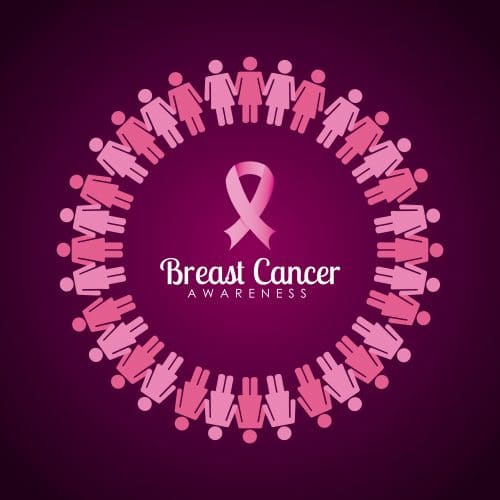Mobile Mammograms- Early Detection Saves Lives

Breast cancer is a disease in which malignant cells form in the tissues of the breast. Cancer begins when healthy cells in the breast change and grow out of control, forming a mass or sheet of cells called a tumor. A tumor can be cancerous or benign.
More women are diagnosed with breast cancer than any other type of cancer, besides skin cancer. This year, an estimated 281,550 women in the United States will be diagnosed with invasive breast cancer, and 49,290 women will be diagnosed with non-invasive breast cancer. Most breast cancers are sporadic, meaning they develop from damage to a person’s genes that occurs by chance after they are born, therefore there is no risk of passing these damaged genes on to children, as the underlying cause of sporadic breast cancer is environmental factors. Doctors estimate that about 5 to 10 percent of breast cancers are linked to gene mutations passed through generations of a family. The most well-known are breast cancer gene 1 (BRCA1) and breast cancer gene 2 (BRCA2), both of which significantly increase the risk of both breast and ovarian cancer.
Researchers have identified hormonal, lifestyle, and environmental factors that may increase your risk of breast cancer. But it’s not clear why some people who have no risk factors develop cancer, yet other people with risk factors never do.
Learn more about breast cancer prevention, preventative care, and early signs of breast cancer below:
Signs and symptoms of breast cancer may include:
- A breast lump or thickening that feels different from the surrounding tissue
- Change in the size, shape or appearance of a breast
- Changes to the skin over the breast, such as dimpling
- A newly inverted nipple
- Peeling, scaling, crusting or flaking of the pigmented area of skin surrounding the nipple or breast skin
- Redness or pitting of the skin over your breast, like the skin of an orange
Breast Cancer and Men
Men can also develop breast cancer. However, it is rare.
All people, whether male or female, are born with some breast cells and tissue. Even though males do not develop milk-producing breasts, a man’s breast cells and tissue can still develop cancer. Even so, male breast cancer is very rare. Less than one percent of all breast cancer cases develop in men, and only one in a thousand men will ever be with breast cancer. Breast cancer in men is usually detected as a hard lump underneath the nipple and areola. Men carry a higher mortality than women do, primarily because awareness among men is less and they are less likely to assume a lump is breast cancer, which can cause a delay in seeking treatment. The majority of men diagnosed are over the age of 50.
Detection and Breast Cancer Prevention
Mammography is the best tool doctors have to perform cancer screening in healthy women for breast cancer, as it has been shown to lower deaths from the disease. Digital mammography may be better able to find breast cancers, particularly in women with dense breasts. The mammograms that Invision Diagnostics offers are 3D mammograms versus traditional 2D or X-ray exams. This type of mammogram finds more breast cancers and offers fewer false positives than traditional 2D mammograms, and Invision mobile mammogram buses are equipped with industry-leading 3D imaging units. If you have previously had a mammogram at another location, a Breast Fellowship Board Certified Radiologist compares current images to your previous imaging. Reports are then sent to your Med First provider and a letter is mailed to you.
According to the American Cancer Society, when breast cancer is detected early and is in the localized stage, the 5-year relative survival rate is 99%. Early detection includes doing monthly breast self-exams and scheduling regular clinical breast exams and mammograms. Other things to consider are:
- Perform monthly breast self-exams
- Forty percent of diagnosed breast cancers are detected by women who feel a lump, so establishing a regular breast self-exam is very important.
- Drink alcohol in moderation
- Current research suggests that having more than 1 to 2 servings, per day raises the risk of breast cancer, as well as the risk of having cancer come back after treatment.
- Exercise & Maintain a healthy weight
- Moderate exercise may protect against breast cancer by helping you maintain healthy body weight, lowering hormone levels, improving metabolism or enhancing “natural killer” cells that fight off abnormal cells.
- Consider not using hormone therapy
- Using hormone replacement therapy after menopause, within the past 5 years or for several years increases a woman’s risk of breast cancer.
Med First goes the extra mile to ensure that 3D mammogram imaging, is accessible, convenient and safe for you and your loved ones. We understand that you may be busy and need more flexibility in locations and appointment days, so we have partnered with Invision Diagnostics to bring mobile mammograms to different Med First locations on weekdays and weekends. Mammograms are billed through insurance and for our self-pay patients, low-cost rates are also available.
To schedule, call our Quality Dept. Team at: 910-455-0052
or email quality@thinkmedfirst.com
To schedule with Invision, visit www.invisiondiagnostics.com, click “Schedule Your 3D Mammogram,” and enter your zip code!
